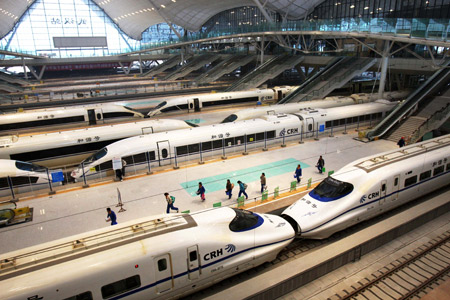Top Biz News
High-speed rail aces critical test
By Xin Dingding and Xie Yu (China Daily)
Updated: 2009-12-10 07:47
|
|
|
Four lines of high-speed trains stop at Wuhan Railway Station in Central China's Hubei province. During a test, the trains ran at an average speed of 350 km/h. [China Daily] |
Passengers from Central China can now reach Guangzhou, the southern economic hub, within three hours as the nation carries out its ambitious high-speed railway plan.
The new high-speed railway linking Wuhan, capital of Central China's Hubei province, and Guangzhou successfully passed a critical operations test yesterday and could be open to the public later this month.
The rail cuts the previous travel time of 10 hours between the two cities to less than three hours with an average speed of 350km/h. Chinese media said it is the longest railway with the world's fastest trains.
Ticket prices have not been published yet. Earlier reports said it might be 500 yuan ($73), double the current berth ticket price.
Although travel agencies are concerned the pricey high-speed train may not be a hit with the public, experts say the project is in itself a technological marvel that cost an investment of 100 billion yuan.
"A successful operation of the high-speed railway of more than 1,000 km will help demonstrate China's technological strength ... and appeal to countries like Russia, India and the United States, which also have broad territories and a plan for building high-speed railways," said Yang Hao, professor in railway transport with Beijing Jiaotong University.
Earlier media reports said countries such as Russia, the US and India have expressed interest in working with China.
A railway researcher told China Daily earlier that the long-distance, high-speed railway is more demanding on train manufacturing technologies than China's first 120-km, high-speed rail link between Beijing and Tianjin.
China also has ambitions of building high-speed railways over 80 percent of the current network of airlines by 2020 to offer passengers a cheaper, more reliable ride. It wants to cover 70 percent of the country's key cities.
According to a blueprint by the Ministry of Railway, the mainland will build 16,000 km of high-speed railway by 2020, with trains running as fast as 350km/h.
By 2012, 42 high-speed railway links amounting to 13,000 km will be finished, of which 5,000 km will be operated at 250km/h, while 8,000 km will run at 350km/h.














